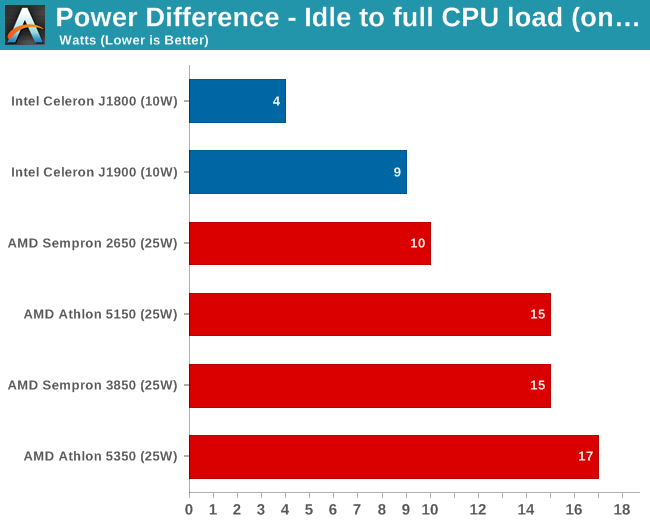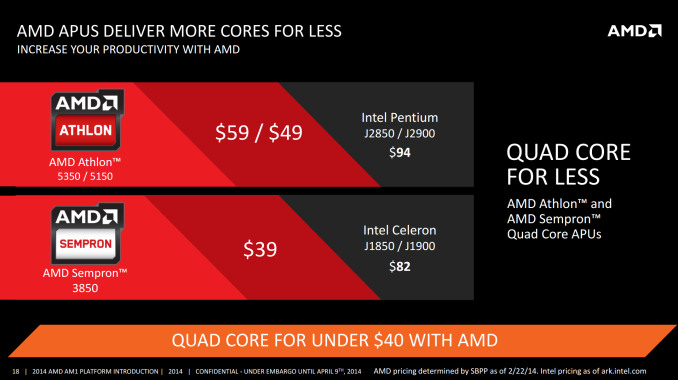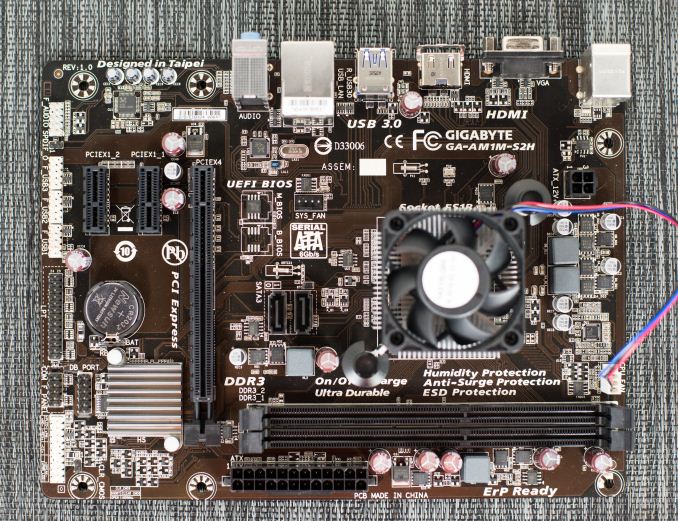AMD AM1 Kabini Part 2: Athlon 5350/5150 and Sempron 3850/2650 Tested
by Ian Cutress on May 29, 2014 2:00 PM ESTThe Competition
Because AMD is the first x86 CPU manufacturer to move their tablet focused processors into the socketed market along with low-cost motherboards, Intel has no direct comparative product. We have to look to their Bay Trail-D SoC range which loses that upgradable functionality. Competition between AMD and Intel on this front is a tit-for-tat operation, with each company focusing on their different strengths. AMD’s integrated IGP aims to be more powerful than the equivalent Intel along with support for DDR3-1600 memory, as well as cheaper overall, however Intel can boast dual channel memory and a lower power output.
With all these differences between Kabini and Bay Trail, including price, power and cores/threads, it is hard to find Intel parts that accurately match each other. AMD has put the following in front of reviewers to provide a guide:
AMD consider the Athlon 5350/5150 parts (quad core, 2.05 GHz and 1.6 GHz) in line with the Intel Pentium J2850/J2900, and the Sempron 3850 with the J1850/J1900. For this Part 2 we were able to obtain full Celeron J1800 (dual core) and Celeron J1900 (quad core) Bay Trail-D parts for testing. Even though AMD puts the Athlon 5350 in the path of the J2900, the J2900 is primarily an OEM solution used by Acer. A single J2900 motherboard appeared on Newegg a week after we had packed up testing.
In fact, I think the 5350 vs the J1900 is a better fit:
| AMD Athlon 5350 vs. Intel Celeron J1900 | ||||
| Athlon 5350 | Celeron J1900 | |||
| CPU Architecture | Jaguar | Silvermont | ||
| CPU Cores | 4 | 4 | ||
| CPU Frequency | 2.05 GHz | 2.0 GHz / 2.4 GHz Turbo | ||
| GPU Cores | 128 SPs | 6 EUs | ||
| GPU Frequency | 600 MHz | 688 MHz | ||
| Memory Channels | Single | Dual | ||
| Memory Frequency | 1600 MHz | 1333 MHz | ||
| L2 Cache | 2 MB | 2 MB | ||
| TDP | 25 W | 10 W | ||
| Price | $59 | $82 | ||
Also we can now directly compare pricing. Take for example the two of the motherboards we had for this review, one J1900 and the other AM1 while equipping the system with an Athlon 5350:
GIGABYTE J1900N-D3V: $87 (Newegg)
GIGABYTE AM1M-S2H: $35 (Newegg)
AMD Athlon 5350: $65 (Newegg)
Totaling up the AMD components gives $100 vs $87 from Newegg, or £65 vs. £66 on Amazon UK, on the extreme high end of a Kabini AM1 setup. Pricing is also influenced slightly by quoting the boxed version of the APU, rather than the OEM pricing that AMD likes to quote.
Our test setup is a follows:
| Test Setup | |
| CPU | AMD Athlon 5350, Quad Core, 2.05 GHz |
| AMD Athlon 5150, Quad Core, 1.60 GHz | |
| AMD Sempron 3850, Quad Core, 1.30 GHz | |
| AMD Sempron 2650, Dual Core, 1.45 GHz | |
| Motherboard | GIGABYTE AM1M-S2H |
| Memory | 2x4GB DDR3-1600 9-10-10 |
| SSD | OCZ Vertex 3 |
| Power Supply | OCZ 1250W ZX Series |
| Graphics | Integrated |
| Graphics Drivers | 14.3 Beta |
Note that for our benchmark results we are also taking data from previous reviews done at AnandTech, including some of the higher powered mainstream systems. Over time we have added benchmarks (such as SYSmark 2014) which are lacking some of the mid-range data.
Power Consumption: Idle to 100% CPU Load (on IGP)

Because of the difference in TDP, the AMD APUs here use more energy, although all four comfortably use less than the 25W TDP. The dual core especially only registered a 10W difference from idle to a full CPU load.













87 Comments
View All Comments
mikk - Thursday, May 29, 2014 - link
G1820 is missing or at least a cheap Haswell Pentium.hojnikb - Thursday, May 29, 2014 - link
Yes that would be really great, since those chips are price about the same.jospoortvliet - Sunday, June 1, 2014 - link
These do use far more power.On that note, why on earth doid the reviewer compare power usage over idle (never seen that particular metric at anandtech?!?) While not mentioning the idle power (according to various other sites, the amd's sport significant lower idle power). I don't like to think so but this is probably the only power metric to make the atoms look remotely good... Why was it chosen?
savagemike - Thursday, May 29, 2014 - link
I agree completely. If I were building a budget desktop right now that is exactly the chip (or similar) which I'd be comparing these to.MikeMurphy - Thursday, May 29, 2014 - link
I can buy a G3220 Haswell Pentium running at 3.0ghz for $60. I was really hoping this would make it into this review!!Stuka87 - Thursday, May 29, 2014 - link
The G3220 is a 53W chip. These are 25W chips. They do not compete with each other.HisDivineOrder - Friday, May 30, 2014 - link
Atom chips are 10W chips. These Semprons are 25W. They do not compete with each other.See how that doesn't impact the fact that people are talking about more than just wattage? ;) Some people just want to know what the best VALUE is per dollar and these low end options are all in the running.
Why limit yourself to just discussing wattage-appropriate? Especially when those Semprons are already over twice the Atom chips in terms of watts.
bsim500 - Friday, May 30, 2014 - link
"The G3220 is a 53W chip. These are 25W chips. They do not compete with each other."Intel's TDP is way overstated on its dual-cores. My "55w" i3 pulls about 32w in reality (measured at the wall, not calculated). I've seen Haswell Pentium's that are sub-30w, (full speed not the slow "T" variants). They are very definitely in the same bracket. In fact, at stock 3.4GHz, with a -0.15v undervolt, I can get my "77w" i5-3570 down from a measured 59w (1.1v) to around 47w (0.95v). At 3.0GHz at 0.83v, you're looking at 36w 4T / 25w 2T (for an i5). AMD's Kabini's are still on 28nm vs Intel's 22nm, and you'd be surprised just how low you can go with undervolting the latter's "big cores".
silverblue - Friday, May 30, 2014 - link
The point is moot as AMD is known for overvolting its processors; an article on Kabini would be very interesting.lyeoh - Sunday, June 1, 2014 - link
Which is why this article needs some actual power consumption benchmarks.